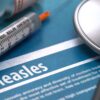The Alabama Department of Public Health and the University of Alabama were recently awarded a $2 million federal grant that will be used to remove environmental and safety hazards from homes in the Black Belt region.
The Healthy Homes and Healthy Communities in the Black Belt Region of Alabama program aims to target 50 low-income homes in the Black Belt to remove environmental and safety hazards, according to a press release. The University of Alabama SafeState Program and the Alabama Life Research Institute will help manage the grant and the project.
“This program not only allows us to identify health and safety issues in these underserved communities, but it also gives us the resources to solve some of the problems,” Michael Rasbury, director of the university’s SafeState Environmental Programs, said in a statement. “Qualifying participants can receive up to $10,000 for repairs designed to reduce or eliminate identified hazards.”
The 24-month project will address problems including indoor air quality, mold and moisture, pests, carbon monoxide, lead-based paint, asbestos and radon, and indoor and outdoor structural issues, according to the release.
The Alabama Department of Public Health and the University of Alabama are working on an application process for prospective homeowners to take part in the program, which will come at no cost to them.
Goals for the project are:
- Maximize both the number of vulnerable residents protected from housing-related environmental health and safety hazards and the number of housing units where these hazards are controlled.
- Identify and remediate housing-related health and safety hazards in privately owned, low-income rental and/or owner-occupied housing, especially in units and/or buildings where families with children, older adults 62 years and older, or families with persons with disabilities reside.
- Promote cost-effective and efficient healthy home methods and approaches that can be replicated and sustained.
- Build and enhance partner resources to develop the most cost-effective methods for identifying and controlling key housing-related environmental health and safety hazards.
- Promote collaboration, data sharing and targeting between health and housing departments.
- Ensure to the greatest extent feasible that job training, employment, contracting, and other economic opportunities generated by this grant will be directed to low- and very-low-income persons, particularly those who are recipients of government assistance for housing, and to businesses that provide economic opportunities to low- and very low-income persons in the area in which the project is located.


















































